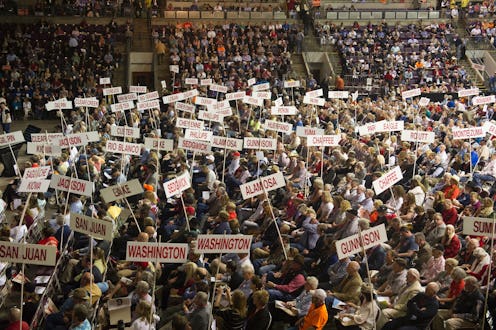News
Candidates Can Pay Delegates At An Open Convention
The New York primary is big for both parties, but especially for the Republicans. If Donald Trump doesn't win most of the state's 95 delegates, it becomes even more likely that the Republican National Convention in July will be contested, meaning the nominee won't be automatically determined before the first round of voting. If that ends up being the case, the candidates will descend into a delegate frenzy, using any means available to secure the nomination before someone else beats them to it. This year, with Donald Trump's deep pockets and Ted Cruz's super PAC backers, that means money — paying for meals, travel expenses, trips to Florida, and anything else you can think of to swing delegates. It's perfectly legal for candidates to pay delegates at a brokered convention, and it could have a deciding impact on this year's Republican race.
According to Republican election lawyer Ben Ginsberg, the infrequency of brokered conventions means that there aren't a lot of rules to regulate the candidates' interactions with delegates — the 2,000 or so people who get to decide the party's nominee. Back during the last brokered convention in 1976, when incumbent President Gerald Ford was fighting off a challenge from Ronald Reagan, Ford offered the delegation from Mississippi some pretty incredible things in exchange for their votes.
"I believe there were rides provided on Air Force One. ... It's legal," said Ginsberg during an appearance on the NPR Politics Podcast. "I believe that wavering delegates were invited to state dinners. I believe that there were conversations between Ford aides and delegates about the virtues of Gerald Ford, and that's certainly legal." Even the specifically prohibited isn't really off the table. "There is a statute that prohibits the offer of a federal job, but telling somebody that, 'Gee, you look like a really accomplished individual, and we want you to be a part of what we get going forward once we're elected' is certainly permissible," Ginsberg explained. Anything short of a flat-out bribe would be OK. And the bribe is actually still allowed; it would just probably be frowned upon.
It seems as though this lapse in the rules will disproportionately benefit Donald Trump, whose vast personal fortune can be spent to swing delegates. And since he's likely to go into the convention leading in delegates, he'll have fewer to concentrate his spending on, just like Gerald Ford did with the Mississippi delegates. If the convention opens and there's no clear leader, it already seems clear who the winner will be.
Hopefully, the Republican National Committee will recognize a need to fix these loopholes before that becomes a possibility. Between Citizens United and Donald Trump self-financing a big chunk of his campaign, this election seems more and more like it's been bought and paid for, which is pretty much the opposite of the way democracy is supposed to work. Restoring some neutrality to the proceedings so that delegates can actually pick the best person for the job instead of being influenced by money would go a long way toward changing the mindset in the country's political system. The Rules Committee meets before the convention to determine the rules going forward, so there's a chance that this oversight can be corrected before it's too late.
